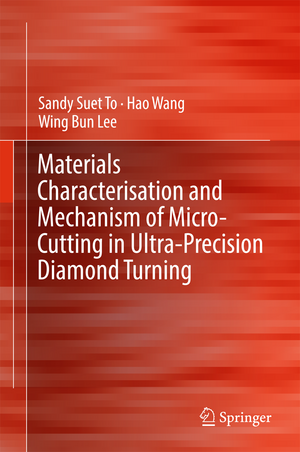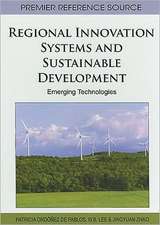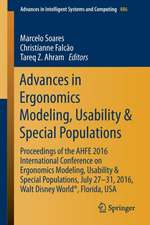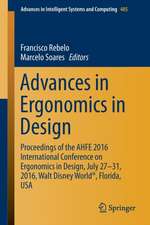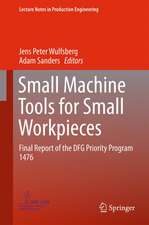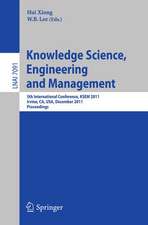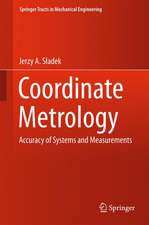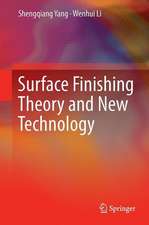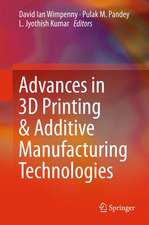Materials Characterisation and Mechanism of Micro-Cutting in Ultra-Precision Diamond Turning
Autor Sandy Suet To, Hao Wang, Wing Bing Leeen Limba Engleză Hardback – 31 mai 2017
In the context of subtractive manufacturing, ultra-precision diamond turning is based on the pillars of materials science, machine tools, modeling and simulation technologies, etc., making the study of such machining processes intrinsically interdisciplinary. However, in contrast to the substantial advances that have been achieved in machine design, laser metrology and control systems, relatively little research has been conducted on the material behavior and its effects on surface finish, such as the material anisotropy of crystalline materials. The feature of the significantly reduced depth of cut on the order of a few micrometers or less, which is much smaller than the average grain size of work-piece materials, unavoidably means that conventional metal cutting theories can only be of limited value in the investigation of the mechanisms at work in micro-cutting processes in ultra-precision diamond turning.
| Toate formatele și edițiile | Preț | Express |
|---|---|---|
| Paperback (1) | 943.73 lei 6-8 săpt. | |
| Springer Berlin, Heidelberg – 6 aug 2018 | 943.73 lei 6-8 săpt. | |
| Hardback (1) | 1113.09 lei 6-8 săpt. | |
| Springer Berlin, Heidelberg – 31 mai 2017 | 1113.09 lei 6-8 săpt. |
Preț: 1113.09 lei
Preț vechi: 1357.43 lei
-18% Nou
Puncte Express: 1670
Preț estimativ în valută:
213.01€ • 222.11$ • 177.04£
213.01€ • 222.11$ • 177.04£
Carte tipărită la comandă
Livrare economică 21 martie-04 aprilie
Preluare comenzi: 021 569.72.76
Specificații
ISBN-13: 9783662548219
ISBN-10: 3662548216
Pagini: 266
Ilustrații: X, 266 p. 199 illus.
Dimensiuni: 155 x 235 x 18 mm
Greutate: 0.57 kg
Ediția:1st ed. 2018
Editura: Springer Berlin, Heidelberg
Colecția Springer
Locul publicării:Berlin, Heidelberg, Germany
ISBN-10: 3662548216
Pagini: 266
Ilustrații: X, 266 p. 199 illus.
Dimensiuni: 155 x 235 x 18 mm
Greutate: 0.57 kg
Ediția:1st ed. 2018
Editura: Springer Berlin, Heidelberg
Colecția Springer
Locul publicării:Berlin, Heidelberg, Germany
Cuprins
Introduction.- Basic Concepts and Theory.- Machinability of Single Crystals in Diamond Turning.- Deformation Behaviour of Diamond-Turned Surface Layer.- Orientation Changes of Substrate Materials.- Influences of Material Swelling Upon Surface Roughness.- A Microplasticity Analysis of Shear Angle, and Micro-cutting Force Variation.- Crystal Plasticity Finite Element Modeling of Orthogonal Cutting of Single Crystal Materials.- Elastic Strain Induced Shear Bands in the Micro-cutting Process.- Regularly Spaced Shear Band and Morphology of Serrated Chip Formation.- Theoretical and Experimental Investigation of Tool-tip Vibration.- Influence of Tool-tip Vibration on Surface Roughness and the Representative Surface Measurement.- Dynamic Modelling of Shear Band Formation and Tool-tip Vibration in Ultra-precision Diamond Turning.
Textul de pe ultima copertă
This book presents an in-depth study and elucidation on the mechanisms of the micro-cutting process, with particular emphasis and a novel viewpoint on materials characterization and its influences on ultra-precision machining. Ultra-precision single point diamond turning is a key technology in the manufacture of mechanical, optical and opto-electronics components with a surface roughness of a few nanometers and form accuracy in the sub-micrometric range.
In the context of subtractive manufacturing, ultra-precision diamond turning is based on the pillars of materials science, machine tools, modeling and simulation technologies, etc., making the study of such machining processes intrinsically interdisciplinary. However, in contrast to the substantial advances that have been achieved in machine design, laser metrology and control systems, relatively little research has been conducted on the material behavior and its effects on surface finish, such as the material anisotropy of crystalline materials. The feature of the significantly reduced depth of cut on the order of a few micrometers or less, which is much smaller than the average grain size of work-piece materials, unavoidably means that conventional metal cutting theories can only be of limited value in the investigation of the mechanisms at work in micro-cutting processes in ultra-precision diamond turning.
In the context of subtractive manufacturing, ultra-precision diamond turning is based on the pillars of materials science, machine tools, modeling and simulation technologies, etc., making the study of such machining processes intrinsically interdisciplinary. However, in contrast to the substantial advances that have been achieved in machine design, laser metrology and control systems, relatively little research has been conducted on the material behavior and its effects on surface finish, such as the material anisotropy of crystalline materials. The feature of the significantly reduced depth of cut on the order of a few micrometers or less, which is much smaller than the average grain size of work-piece materials, unavoidably means that conventional metal cutting theories can only be of limited value in the investigation of the mechanisms at work in micro-cutting processes in ultra-precision diamond turning.
Caracteristici
Is the first comprehensive and interdisciplinary book on the mechanisms of micro-cutting in ultra-precision diamond turning
Includes substantial experimental data on ultra-precision machining
Combines theoretical study with modeling, simulation and applications
Includes supplementary material: sn.pub/extras
Includes substantial experimental data on ultra-precision machining
Combines theoretical study with modeling, simulation and applications
Includes supplementary material: sn.pub/extras
